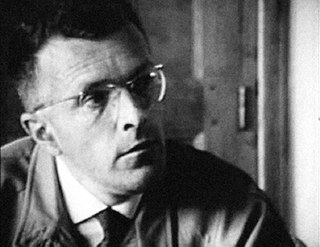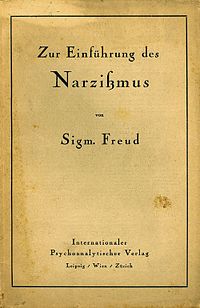The following outline is provided as an overview of and topical guide to critical theory:
The id, ego and superego are the three different, functionally interlocking main components of the human soul, as investigated and defined by Sigmund Freud. They represent the structural model of psychoanalysis. Freud himself used the German terms das Es, Ich, and Über-Ich. The Latin terms id, ego and superego were chosen by his original translators and have remained in use. The terms soul and psyche here are synonymous in the sense of the human organism as a whole, focussing on the mental aspect without any option of concrete separability from matter and therefore in strict distinction to the religious concept of "soul".
The principle of individuation, or principium individuationis, describes the manner in which a thing is identified as distinct from other things.
Positive liberty is the possession of the power and resources to act in the context of the structural limitations of the broader society which impacts a person's ability to act, as opposed to negative liberty, which is freedom from external restraint on one's actions.

Civilization and Its Discontents is a book by Sigmund Freud, the founder of psychoanalysis. It was written in 1929 and first published in German in 1930 as Das Unbehagen in der Kultur.

Otto Friedmann Kernberg is an Austrian-born American psychoanalyst and professor of psychiatry at Weill Cornell Medicine. He is most widely known for his psychoanalytic theories on borderline personality organization and narcissistic pathology. In addition, his work has been central in integrating postwar ego psychology with Kleinian and other object relations perspectives. His integrative writings were central to the development of modern object relations, a school within modern psychoanalysis.

In late modern philosophy, neo-Kantianism was a revival of the 18th-century philosophy of Immanuel Kant. The neo-Kantians sought to develop and clarify Kant's theories, particularly his concept of the thing-in-itself and his moral philosophy.

Gilbert Simondon was a French philosopher best known for his theory of individuation and his work on the field of philosophy of technology. Simondon's work is characterized by his philosophical approach on information theory, communication studies, technology and the natural sciences. Although largely overlooked in his lifetime, the advent of the Information Age has collaborated to a reappraisal and increased interest in Simondon's books, with him being seen as someone who has precisely predicted and described the social effects and paradigms technical objects and technology itself have offered in the 21st century.
In classical Freudian psychoanalytic theory, the death drive is the drive toward death and destruction, often expressed through behaviors such as aggression, repetition compulsion, and self-destructiveness. It was originally proposed by Sabina Spielrein in her paper "Destruction as the Cause of Coming Into Being" in 1912, which was then taken up by Sigmund Freud in 1920 in Beyond the Pleasure Principle. This concept has been translated as "opposition between the ego or death instincts and the sexual or life instincts". In Beyond thePleasure Principle, Freud used the plural "death drives" (Todestriebe) much more frequently than the singular.

On Narcissism is a 1914 essay by Sigmund Freud, the founder of psychoanalysis.
The philosophy of technology is a sub-field of philosophy that studies the nature of technology and its social effects.

Beyond the Pleasure Principle is a 1920 essay by Sigmund Freud. It marks a major turning point in the formulation of his drive theory, where Freud had previously attributed self-preservation in human behavior to the drives of Eros and the regulation of libido, governed by the pleasure principle. Revising this as inconclusive, Freud theorized beyond the pleasure principle, newly considering the death drives which refers to the tendency towards destruction and annihilation, often expressed through behaviors such as aggression, repetition compulsion, and self-destructiveness.

Bernard Stiegler was a French philosopher. He was head of the Institut de recherche et d'innovation (IRI), which he founded in 2006 at the Centre Georges-Pompidou. He was also the founder in 2005 of the political and cultural group, Ars Industrialis; the founder in 2010 of the philosophy school, pharmakon.fr, held at Épineuil-le-Fleuriel; and a co-founder in 2018 of Collectif Internation, a group of "politicised researchers" His best known work is Technics and Time, 1: The Fault of Epimetheus.

The Enneagram of Personality, or simply the Enneagram, is a pseudoscientific model of the human psyche which is principally understood and taught as a typology of nine interconnected personality types.

Acting Out is a book by French philosopher Bernard Stiegler. It is composed of two short works, "How I Became a Philosopher", and "To Love, To Love Me, To Love Us: From September 11 to April 21", which were published separately in French in 2003 as Passer à l'acte and Aimer, s'aimer, nous aimer: Du 11 septembre au 21 avril. Acting Out was published by Stanford University Press in 2009, and the translators were David Barison, Daniel Ross, and Patrick Crogan.
The concept of excessive selfishness has been recognized throughout history. The term "narcissism" is derived from the Greek mythology of Narcissus, but was only coined at the close of the nineteenth century.
Healthy narcissism is a positive sense of self that is in alignment with the greater good. The concept of healthy narcissism was first coined by Paul Federn and gained prominence in the 1970s through the research of Heinz Kohut and Otto Kernberg. It developed slowly out of the psychoanalytic tradition, and became popular in the late twentieth century.
In psychology, narcissistic withdrawal is a stage in narcissism and a narcissistic defense characterized by "turning away from parental figures, and by the fantasy that essential needs can be satisfied by the individual alone". In adulthood, it is more likely to be an ego defense with repressed origins. Individuals feel obliged to withdraw from any relationship that threatens to be more than short-term, avoiding the risk of narcissistic injury, and will instead retreat into a comfort zone. The idea was first described by Melanie Klein in her psychoanalytic research on stages of narcissism in children.

Ernst Simmel was a German-American neurologist and psychoanalyst.

Sigmund Freud is considered to be the founder of the psychodynamic approach to psychology, which looks to unconscious drives to explain human behavior. Freud believed that the mind is responsible for both conscious and unconscious decisions that it makes on the basis of psychological drives. The id, ego, and super-ego are three aspects of the mind Freud believed to comprise a person's personality. Freud believed people are "simply actors in the drama of [their] own minds, pushed by desire, pulled by coincidence. Underneath the surface, our personalities represent the power struggle going on deep within us".










